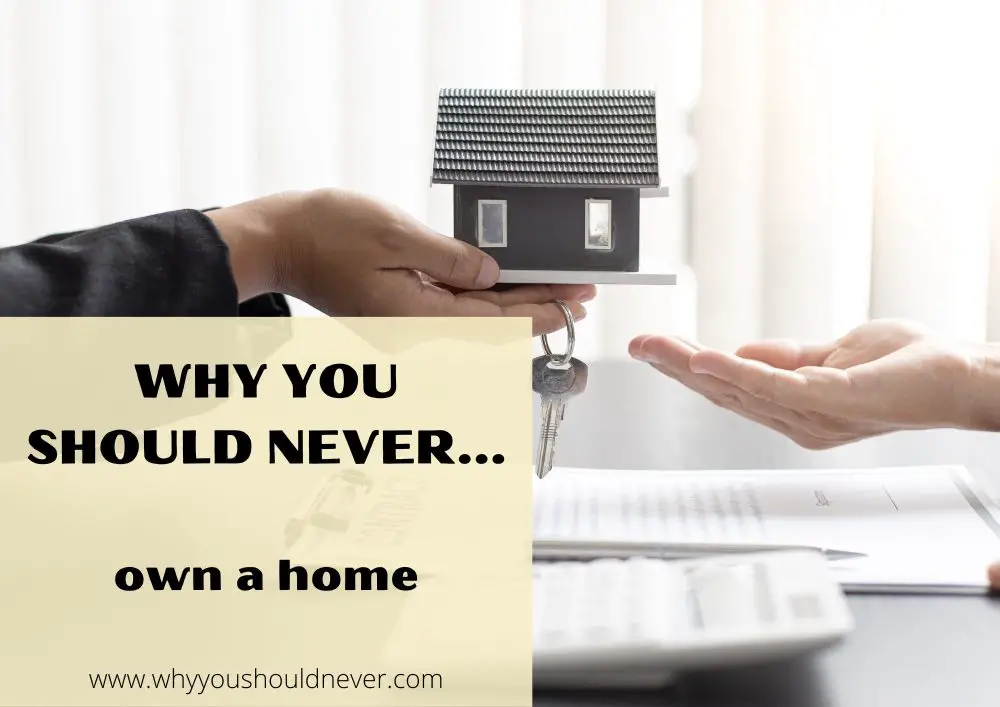![]()
Why You Should Never Own A Home
Owning a home is often considered the ultimate goal for many individuals in our society. We’re told that buying a house means you’ve truly made it and are living the dream.
Home ownership does come with a certain amount of stability and security, I won’t lie. You have control over your space and can make changes to it without having to ask for permission from a landlord or property manager. Plus, you’ll usually build equity in the home as you pay off your mortgage.
Yet, in spite of these perceived benefits, so many people, even those who can afford to buy their homes ten times over, opt to rent instead. Why is that? Let’s explore below.
8 reasons why you shouldn’t own a home
1. The high cost of maintenance and repairs
Once you own a home, all the responsibility for keeping your property in good condition is yours. From regular maintenance tasks like lawn care to more expensive repairs such as replacing a leaky roof, home ownership comes with a hefty price tag that can put you in financial trouble should unexpected issues arise.
2. Buying isn’t necessarily an investment
In an ideal world, the value of the home you purchase would appreciate over time, making it a solid investment. However, this isn’t always the case – home values can fluctuate depending on many factors outside your control.
For example, if a major employer in your area closes down, you may find that the value of your property drops significantly. Or if the neighborhood where you live becomes less desirable for various reasons – such as increased crime rates, traffic congestion or environmental hazards – this will also affect your home’s value.
You could essentially be stuck with a mortgage for a depreciating asset.
3. Limited flexibility and freedom
When you’re tied to a home, it’s harder to pick up and move if your life circumstances change – whether that means getting a new job in another city or country or deciding you want to try out living in different neighborhoods.
4. It’s not just the mortgage you have to pay
When buying a home, you need to consider all the other expenses that come with it. There are closing costs, interest payments, property taxes, insurance premiums, HOA fees (if applicable), and potentially ongoing renovation/upkeep expenses. These additional costs can quickly add up.
5. You may be taking on too much debt
In order to buy a home, many individuals have to take out a large mortgage – which could mean borrowing hundreds of thousands of dollars.
Although banks will typically perform a credit check and assess your ability to repay the loan before approving it, as we saw with the 2008 financial crisis, it’s possible for people to be approved for mortgages they can’t realistically afford.
This debt load can cause a huge amount of stress and financial strain.
6. You might not be able to sell it
Nowadays, people don’t tend to stay in one place their whole lives. There are 1001 reasons why the first home you buy might not be your forever home.
Perhaps your needs change (family size, career changes) or you want to downsize as you get older. However, the housing market may not be in your favor when it comes time to sell.
If there’s an oversupply of homes for sale and a lack of buyers, you might end up having to stay put – which can have financial and emotional implications.
7. There’s limited help available if you run into financial trouble
While there are various forms of support and social housing available for renters who fall on difficult times (at least in some countries), the same cannot be said for homeowners.
If you can’t make your mortgage payments – whether due to job loss, an unexpected expense or illness – you could end up in foreclosure. This not only means that you lose your home, but it also makes it harder to get approved for future loans or credit.
8. Renting frees up your funds for better investments
Owning a home ties up your funds in one asset, which means you’re not able to invest in other opportunities that could generate higher returns.
Think about it: unless the house you own is being rented out to others for a profit, it’s not an asset but a liability.
Meanwhile, renters can take their disposable income and invest in stocks or other investment vehicles that have higher potential for returns.
Plus, as a renter, you won’t be putting all your eggs in one basket. Diversification is key when it comes to managing your financial risk.
Conclusion
I know it sounds absurd to say that owning a home may not be the dream we’ve been sold, but it’s a reality that more and more people are coming to terms with. While there’s no denying the allure of home ownership, thoughtful consideration of one’s financial position and future plans is key.
Of course, everyone’s situation is different. If you’re in the position to buy and know you can comfortably afford it without stretching yourself too thin financially or emotionally, then perhaps owning a home will work for you.
But if you’re someone who prefers flexibility in life and wants the freedom to move more easily or invest your funds elsewhere, then renting may be a better option.
